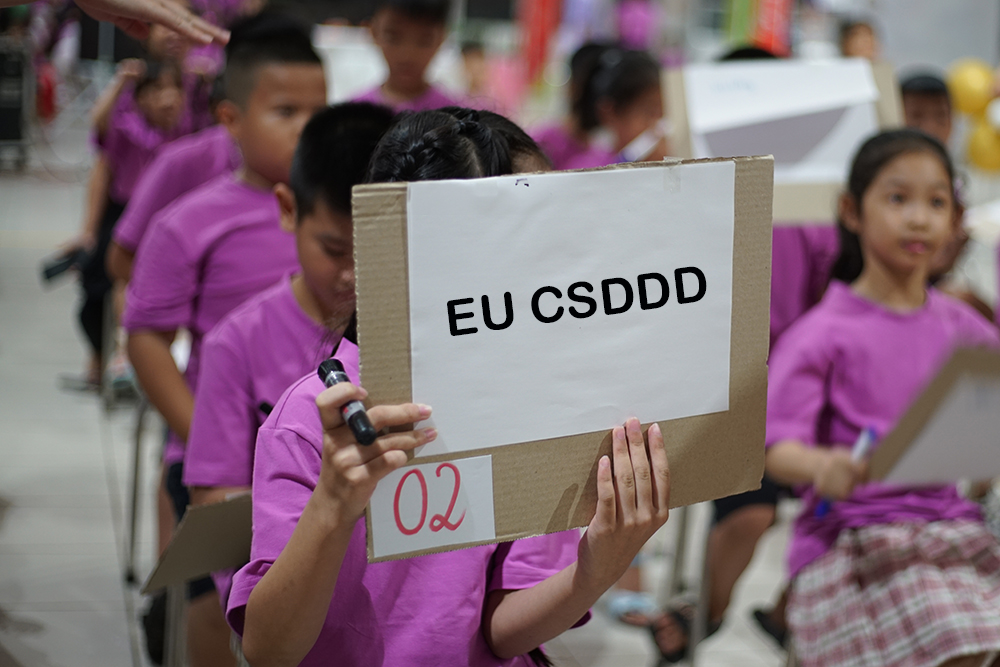

Confucius once famously said, “It does not matter how slowly you go as long as you do not stop.”
After a long, bumpy journey marked by setbacks and uncertainty, the long-awaited Corporate Sustainability and Due Diligence Directive (CSDDD) has passed through all the hoops and was approved by the European Parliament on April 24, which means it will now be written into law. The CSDDD compels companies to proactively identify, assess, prevent and mitigate potential and actual adverse impacts in supply chains, and to remediate these adverse impacts. Failure to do so can lead to hefty penalties (up to 5% of the net worldwide turnover of the company), administrative sanctions and civil liability. Although it has been scaled back from its original scope, its approval has ushered in a collective sigh of relief – including here at The Centre. This is a significant milestone that will impact millions of people and families in supply chains.
Its reduced scope is of course a point of contention and disappointment for those hoping for a more wide-reaching regulation. The original directive aimed towards companies with over 500 employees and a €150 million turnover would have created more impact. Instead, the minimum threshold is now 1,000 employees and €450 million turnover, with the implementation set to be introduced in three phases from 2027-2029. But even so, this directive has bite and is a major opportunity to accelerate change. A regulation like this would have been unimaginable ten years ago and is a testimony to how far we’ve come in terms of corporate sustainability and human rights in supply chains. And let’s also not forget that its scope is not unchartered territory; it complements companies’ existing ESG efforts and a growing chorus of global human rights regulations for companies' supply chains like the German Act on Corporate Due Diligence Obligations in Supply Chains (Lieferkettensorgfaltspflichtengesetz), the recently-adopted EU Forced Labour Regulation and many more.
So, what does it mean for the people in supply chains? Although the final text of the CSDDD has not yet been released, the CSDDD exerts a wider influence than any existing regulation in terms of supply chain and protected rights, largely because it applies to the entire value chain. According to the latest draft of the CSDDD, due diligence obligations apply to the companies’ own business activities, the activities of subsidiaries, direct suppliers, indirect suppliers and the distribution, transport and storage of products – in other words, both downstream and upstream actors. For years we’ve all been discussing “breaking the cycle of child labour” or “breaking the cycle of poverty” with limited effect – but now is the chance for meaningful action.
How? In theory, the CSDDD will lead to a trickle-down effect that will reach smaller companies in its supply chain, where change is most needed. Large companies will now face the task of getting those smaller companies on board to deliver the same level of transparency around human rights. Challenging? Yes. Impossible? No. In fact, many companies working with The Centre on child rights risk assessments, child labour prevention and remediation programmes, youth development and even family-friendly workplace programmes are already engaging their suppliers and sub-suppliers to address human rights due diligence. What will be important and a true test in our view however, is ensuring that this trickle-down effect begins straight away, and not just in five years when the “smallest” companies fall within the directive’s scope. It is also important to note that the CSDDD encourages a precise and pragmatic approach to due diligence that doesn’t simply mean lengthier codes of conducts. To full comply, companies will have to develop systems and protocols to identify and actively manage negative impacts on human rights, working closely with their suppliers to achieve this.
Finally, for this legislation to be truly impactful, it is crucial for all human rights due diligence (HRDD) interventions – be it on a corporate policy-level or practical implementation on the ground – to never lose sight of the heart of the issue: that businesses take proactive measures to ensure their practices and operations, both direct and indirect, do not violate the basic human rights of their employees, the workers and their families of their suppliers or business partners, and the communities where they operate.
If companies can ensure that this goal will always be the number one driver of their HRDD, their guiding star in corporate sustainability, then we will see positive change. Millions of people and their families are pinning their hopes on it to lead better lives. We must not let them down.
(This article was updated from the original on April 25)
By using this website, you agree to our use of cookies. We use cookies to provide you with a great experience and to help our website run effectively.